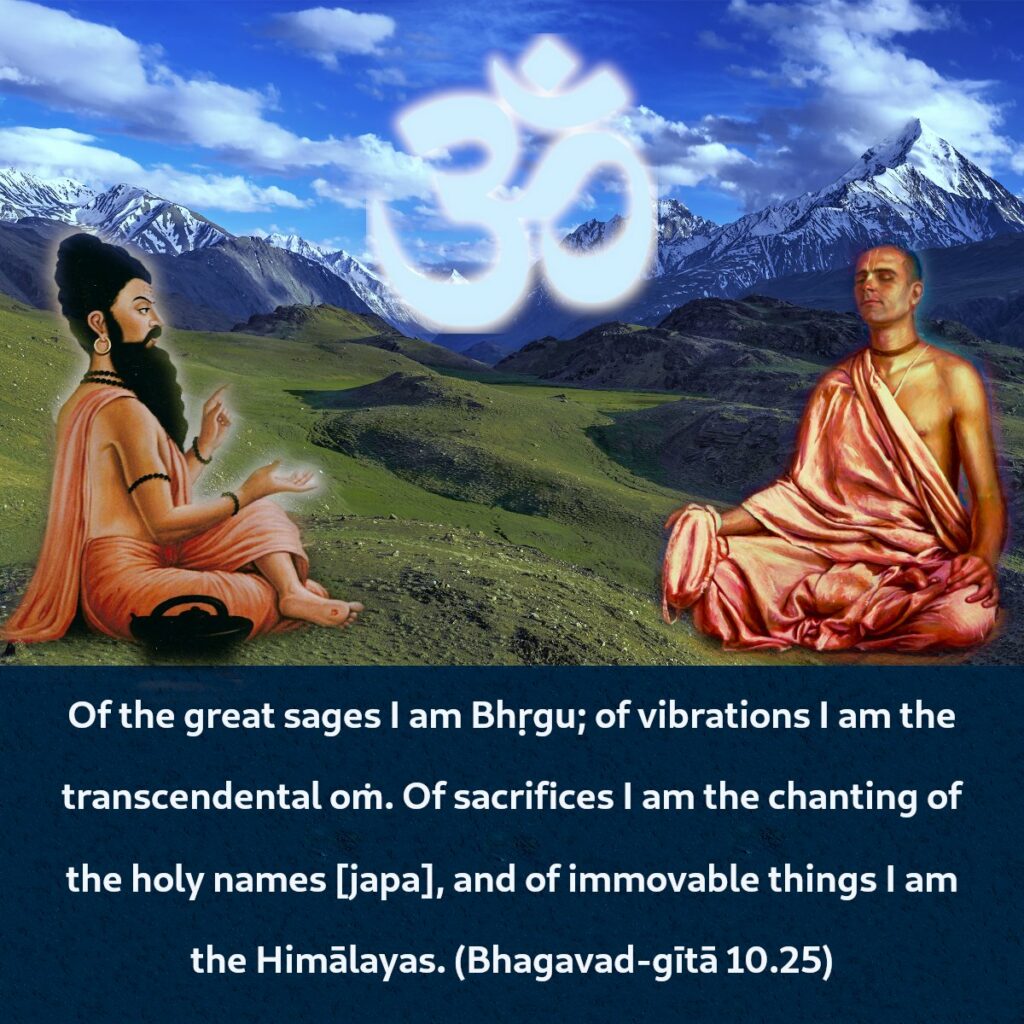महर्षीणां भृगुरहं गिरामस्म्येकमक्षरम् |
यज्ञानां जपयज्ञोऽस्मि स्थावराणां हिमालय: || 25||
maharṣhīṇāṁ bhṛigur ahaṁ girām asmyekam akṣharam
yajñānāṁ japa-yajño ’smi sthāvarāṇāṁ himālayaḥ
mahā-ṛiṣhīṇām—among the great seers; bhṛiguḥ—Bhrigu; aham—I; girām—amongst chants; asmi—I am; ekam akṣharam—the syllable Om; yajñānām—of sacrifices; japa-yajñaḥ—sacrifice of the devotional repetition of the divine names of God; asmi—I am; sthāvarāṇām—amongst immovable things; himālayaḥ—the Himalayas
Translation:
Of the great rishis I am Bhrigu, and of words I am the monosyllable “Om.” Of sacrifices I am the sacrifice of japa; of immovable things I am the Himālaya.
Commentary:
Ekamaksharam -Though there are thousands of words, yet the single syllable OM (Pranava) is the Lord Himself. He is Pranava. The sanctity and the divinity of this syllable ‘OM’ is declared many times in the Scriptures. It is the greatest purifier. It is the sound symbol of Brahman. Its repetition removes all sins. Contemplation of its meaning and significance leads to Moksha. Of what avail is it to waste the precious breath of life in endless talking of a thousand useless and undesirable matters? May all the seekers take to Pranava with faith, and thereby derive the highest spiritual reward.
Japayajnosmi: The Lord declares that He is the sacrifice of silent repetition (japa) among the sacrifices. The sacred power of Japayajna is thus proved by the Lord Himself. It is the most powerful act of sacrifice. All the impurities, vicious tendencies, and violent passions are removed by Japayajna. Other sacrifices mentioned in the Vedas are difficult to perform for the common man, because they require wealth, labour and the help of many people. But nothing is needed for this Japa Yajna. Everyone can do it. There are several Mantras mentioned in the scriptures for Japa. The seeker can choose any one of them and perform this sacrifice to his heart’s content with ease and facility. The Lord is pleased with this yajna. Nay, it is the Lord Himself. Let all the aspirants carry on this Yajna for self-purification and attain Self-realisation.
Sri Ramakrishna Says —
DR. SREENATH (to his friends): “Everything is under the control of Prakriti. Nobody can escape the fruit of past action. This is called prarabdha.”
MASTER: “Why, if one chants the name of God, meditates on Him, and takes refuge in Him —”
DR. SREENATH (to his friends): “But, sir, how can one escape prarabdha, the effect of action performed in previous births?”
MASTER: “No doubt a man experiences a little of the effect; but much of it is cancelled by the power of God’s name. A man was born blind of an eye. This was his punishment for a certain misdeed he had committed in his past birth, and the punishment was to remain with him for six more births. He, however, took a bath in the Ganges, which gives one liberation. This meritorious action could not cure his blindness, but it saved him from his future births.”
DR. SREENATH (to his friends): “But, sir, the scriptures say that nobody can escape the fruit of karma.”
Dr. Sreenath was ready to argue with the Master.
MASTER (to M.): “Why don’t you tell him that there is a great difference between the Isvarakoti and an ordinary man? An Isvarakoti cannot commit sin. Why don’t you tell him that?”
M. remained silent and then said to Rakhal, “You tell him.”
After a few minutes the physicians left the room. (Source: Gospel of Sri Ramakrishna)
Bhagavad Gita: Chapter 10 🔻 (42 Verses)
